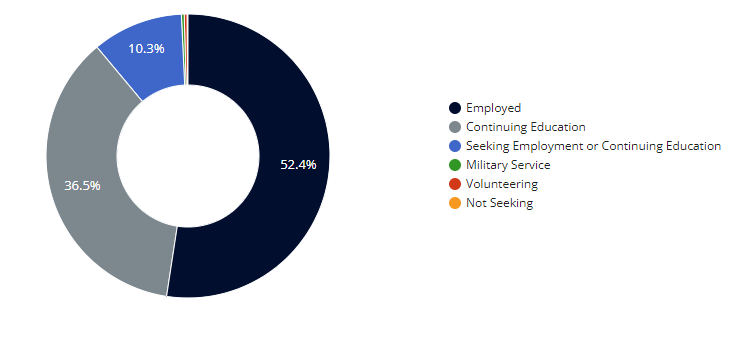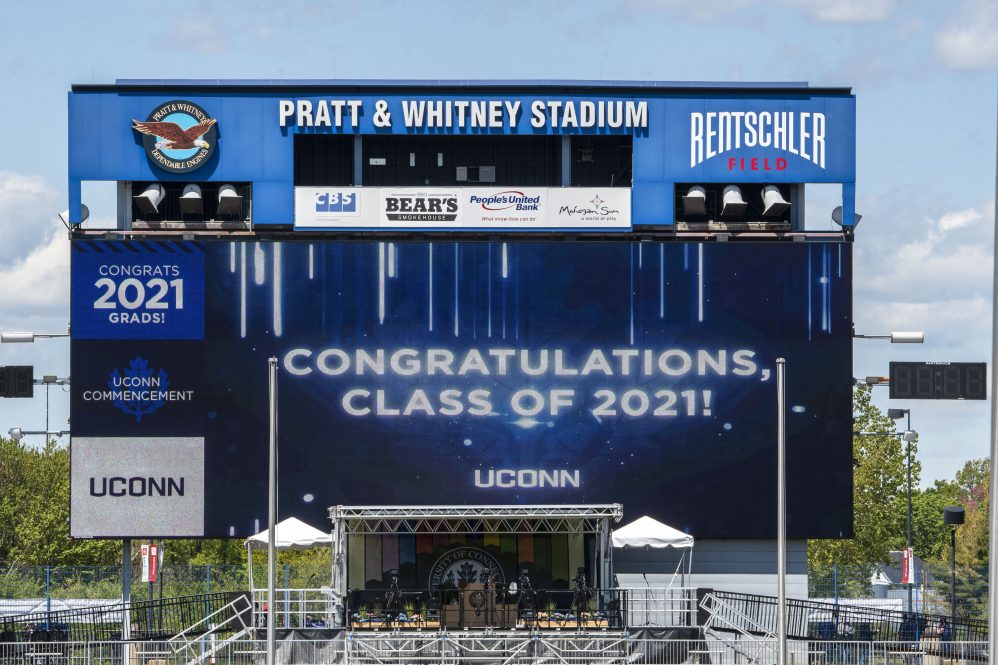Continuing a tradition set by their predecessors, members of UConn’s Class of 2021 were overwhelmingly settled in first jobs or pursuing higher education within six months of graduating last spring, new data shows.
In fact, 90% of last spring’s graduates had favorable outcomes by the end of 2021, including 52% who were employed; 37% who were pursuing advanced degrees; and 1% who were engaged in other pursuits of their choosing such as military or volunteer service. The remaining 10% were still seeking opportunities.
The percentage of students with favorable outcomes has increased 6 percentage points since UConn’s Center for Career Development started tracking the outcomes in 2016. The 90% rate for the Class of 2021 also matches the rate achieved by the Class of 2019, the last pre-pandemic graduation cohort.
“We are here to give the best to our students. But moreover, we want to provide every student the skill set to leave the university and truly compete to go after opportunities in their life journey,” UConn Interim President Radenka Maric says.
“Our students have faced challenges unlike any others in recent years, yet continue to succeed in very impressive ways both while at UConn and after graduation,” she adds. “We are proud of their successes. They are resilient, innovative, and ready to tackle any challenge. Go Huskies!”

The new data also illustrates that UConn continues to support the talent pipeline and economic development for the State of Connecticut. Almost two-thirds of the in-state students remained here after graduation, plus 20% of those came to UConn from elsewhere but put down roots in Connecticut after graduating.
UConn officials say the results are even more impressive considering the students finished their studies and launched their post-college careers during the pandemic.
“The numbers speak not only to the ambitious nature of UConn’s graduates, but also to the quality and value of the educational experience offered at the University. This, in addition to nationally recognized programming and services offered by the Career Center, is a true recipe for successful student outcomes,” says Jim Lowe, UConn’s assistant vice provost of the Center for Career Development.
The data comes from the annual Undergraduate First Destination Survey, in which UConn participates along with most other colleges and universities through National Association of Colleges and Employers (NACE) survey protocols.
The survey information and other information – including top employers of UConn graduates, their average starting salaries, employment locations and other details – can be found on the Undergraduate Student Outcomes page of the UConn Center for Career Development.
As anticipated in 2020, a significantly larger percentage of 2021 graduates decided to pursue advanced degrees than in a typical year: 37% of the last graduating class, compared to about 20 to 28% over the previous five years.
Lowe attributed it to two factors: an increase in institutions offering 4+1 programs, in which students can earn their bachelor’s and master’s degrees in five years; and the perception of an unpredictable job market, which motivates some students to pursue advanced degrees rather than enter the work force immediately after graduating.
UConn’s Center for Career Development has programs to connect with students as soon as they come to campus as first-year or transfer students, including through First-Year Experience courses, and continuing throughout their college careers.
In fact, 73% of Class of 2021 graduates used the center’s services during their time at UConn, according to the latest available figures. Nationally, the average is around 54% for colleges and universities.
Also, 78% of the recent UConn graduates reported participating in an experiential learning opportunity – such an internship or a co-op position – during their undergraduate careers.
The value of strong career services on campuses is underscored by several studies, and was recently highlighted in a Forbes article that said career services are poised to become as central to student success as an institution’s curriculum.
That’s both because employers so strongly value experience when making hiring decisions, and because students who feel that their schools are invested in their success tend to remain enrolled through graduation and engaged as alumni.
Even before the pandemic, UConn’s career center designed its programs to be accessible to students without the need to physically visit the office if they needed services during off hours or were away from campus.
Those Career on Demand services have continued, and the Center for Career Development was able to return to some in-person activities in 2021, holding some in-person career and internship fairs while continuing to offer virtual events.
The center recorded more than 227,000 unique visitors last year to its website, which houses extensive programs and resources on demand, including a sizeable library of career-related videos. It’s also trained more than 420 faculty, staff, employer partners and alumni as “Career Champions” throughout the University community who can help students with determining and reaching their goals.
Other resources available for students include the one-credit Senior Year Experience course, connecting with alumni in the Husky Mentor Network, and a wide range of events offered throughout the semester. The center also connects students with Affinity Communities, identity-focused groups that provide students with specialized content that integrates diversity, equity, and inclusion within the career development journey.



